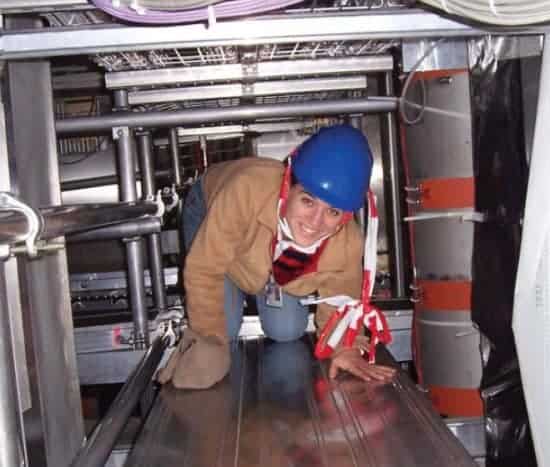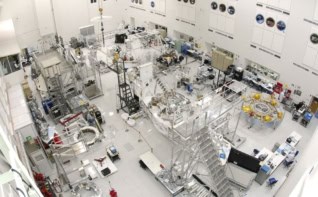
When staff at CERN threaded the first protons around the Large Hadron Collider (LHC) on 10 September last year, the world watched in awe at the prospect of particles being collided at unprecedented energies. But then progress stalled dramatically on 19 September when a poor connection between two superconducting magnet cables disintegrated while carrying a test current of 8.7 kA. The incident, which produced an electrical arc that breached the collider’s liquid-helium cooling system, has meant that 53 magnets have had to be repaired at a cost of about €20m.
Last month CERN announced that protons will re-enter the 27 km ring in late September — six months later than estimated immediately after the incident and two years later than advertised between 2003 and 2006. To avoid another major mishap, by September CERN will have in place a network of cables able to detect nano-ohm rises in resistance in the LHC’s superconducting cables, plus extra helium-relief valves to reduce collateral damage in the unlikely event of a similar fault.
Low-energy collisions are now planned for late October, building up to 10 TeV before the end of the year. To make up for lost time, CERN will then run the LHC straight through next winter and on into autumn 2010 — incurring an extra €8m in electricity costs (40% of the LHC’s annual bill) but putting the lab pretty much where it would have been had the LHC not broken down. By mid-2010 the LHC should have enough data to rival the Tevatron proton–antiproton collider at Fermilab in the US, which has an energy of about 2 TeV and threatens to steal some of the LHC’s thunder.
Decision time
There are a couple of guys here who are really gutted Dave Newbold, Bristol University
Among those hardest hit by the delays are final-year graduate students who were expecting to publish some of the first LHC data in their theses. “There are a couple of guys here who are really gutted,” says Dave Newbold of Bristol University in the UK.
One student in his group is James Jackson, who works on the Compact Muon Solenoid (CMS) detector — one of the four main experiments at the LHC. “It was massively exciting when it was going well, but then a major disappointment,” says Jackson, adding that he was fortunate to have also worked on high-performance computing and undertaken theoretical work during his PhD.
It breaks my heart that I’ll have spent four years doing a PhD with no data Catherine Wright, University of Glasgow
The UK currently has about 40 experimental particle physicists in the final year of their PhD who work on the LHC and are therefore potentially affected. They include Catherine Wright from the University of Glasgow, who works on the ATLAS experiment and turned up for a six-month stint at CERN just days before the September accident. “It breaks my heart that I’ll have spent four years doing a PhD with no data,” she says, admitting that the lure of analysing LHC data might be enough to make her stay to do postdoc research.
Radical measures
Most students can beef up other aspects of their research to compensate, for instance by improving their analysis routines and running them over simulated LHC data. As CMS spokesperson Jim Virdee points out, “several hundred students have, over the past 15 years, done their theses on CMS”. But other students, particularly those in the US where PhDs last six or seven years, face stricter data requirements that have forced them to take more radical decisions.
There is not an immediate threat of running out of funding, just the threat of being a graduate student for a decade Katy Grimm, Stony Brook University
Katy Grimm of Stony Brook University in New York, who started out on ATLAS and is currently in her fifth year, has decided to do the second half of her thesis on data from the Tevatron’s D0 experiment. “Luckily, there is not an immediate threat of running out of funding, just the threat of being a graduate student for a decade,” she says, estimating that some 10–15 students are switching from the LHC to the Tevatron.
That may turn out to be a shrewd move. The Tevatron is working like a dream and many physicists there think they have a good chance of sighting the Higgs boson in the next two years. “We have a lot of data at the Tevatron, many interesting thesis topics, and good opportunities to contribute to and learn from running experiments,” says co-spokesperson of the D0 collaboration Darien Wood.
Waiting game
But the excitement of searching for new heavy “vector bosons” that may show up early in LHC data has led Stony Brook student Regina Caputo to hang on for a year or two. Fellow ATLAS student Andree Robichaud-Veronneau, currently in her third year at the University of Geneva, is also sticking around, although she has put on hold an analysis looking for supersymmetric particles in favour of something possible with less data, involving the already known J/ψ particle.
An upside of the delay is that physicists will be in a better position to understand the LHC collision data when they start pouring in. Numerous “splash” events obtained during the September start-up, when protons struck graphite collimators and sprayed millions of muons into the detectors, have enabled their subdetectors to be sychronized, which is vital to distinguish between particles produced in successive collisions. Hundreds of millions of cosmic rays recorded so far have allowed the giant experiments to be aligned and calibrated with great precision, which has also provided some data for students.
While the LHC is a long way from its peak design performance, running through next winter should amass almost the same volume of data had it not broken down (assuming it was operated at 10 TeV then). Full-energy collisions at 14 TeV, which will roughly double the machine’s “physics reach”, will not be attempted until mid-2011. Then it will take a couple of years to crank up the proton collision rate before the machine is upgraded.
Jordan Nash of Imperial College London believes that PhD students wishing to remain in physics should not be too downcast. “I don’t belittle the predicament of graduate students,” he says, “but the LHC will run for 10–15 years and soon those students will have the opportunity to do some excellent physics.”



